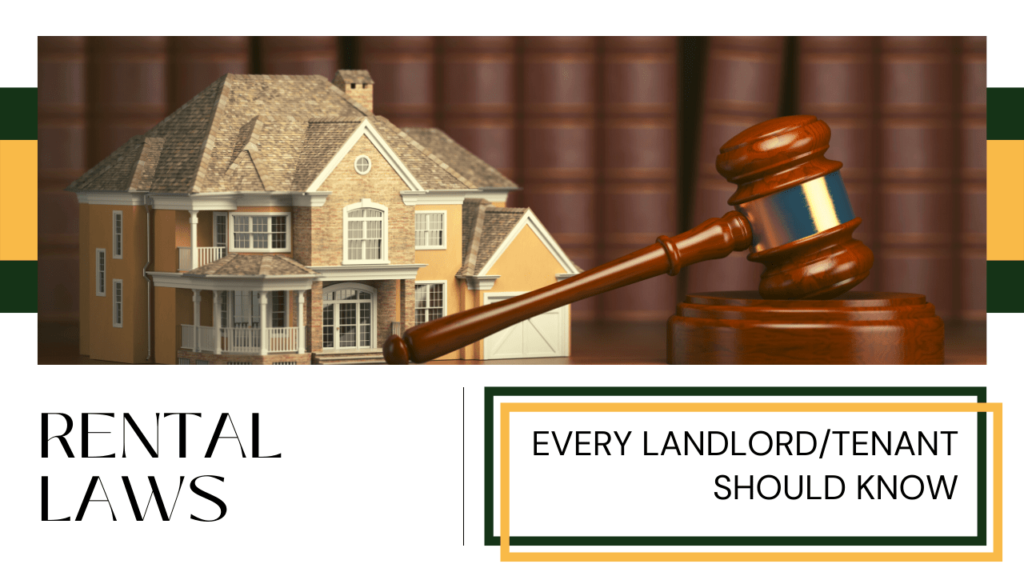
As a leading Colorado Springs property management company, it’s our job to stay up to date on all the laws and regulations that impact the owners and tenants we serve as well as the properties we manage.
There have been quite a few changes in the law over the last few years, and if you’re not able to stay educated on what’s permitted and what’s required, you might find yourself making an expensive legal mistake.
You’ll find a number of federal laws that need your attention, including the Fair Housing Act, Americans with Disabilities Act, and Fair Credit Reporting Act. Those are critical, but today we want to highlight some of the most important and recent Colorado rental laws that you absolutely need to know.
Colorado Tenant Protections and Eviction
At the end of 2021, Colorado passed SB21-173, which was signed into law by Governor Polis. This law included a lot of extra protections for tenants, specifically tenants who struggled to pay rent on time. Here are the most important things you need to know about this law:
-
Eviction Law Update
As a property owner, you can file for eviction due to a tenant’s nonpayment of rent. But, when your tenant is able to provide the full amount of rent that’s owed before a court signs off on the eviction, you are legally required to cancel the eviction and accept the rental payment.
This replaces the former 10-day “cure” period that allowed tenants to try and pay what was overdue, but now with this new law, there are no deadlines or time limits. As long as the money appears before the eviction is legally handed down by the court, you have to let your tenants stay.
-
Health and Safety and Landlord Neglect
In the past, if you were evicting a tenant for nonpayment of rent and that tenant put forward a defense that you were not maintaining the home or it wasn’t habitable, the tenants would still have to pay almost all of the rent that was owed if they wanted to stay in their rental home and not get evicted.
That’s not quite the case anymore. Thanks to the new law, tenants can now use a health and safety defense in court, even if they owe you a lot of back rent. This is a valid reason for them not to be evicted by the courts. So before you bring an eviction proceeding against a tenant, make sure there aren’t any outstanding complaints or maintenance issues that might trip you up during the process.
-
Same-Day Eviction Hearings
In some cases, eviction hearings were conducted on the same day that a landlord in Colorado filed for eviction. It provided for a fast resolution to a tenant who was not paying rent and had exhausted all other options in resolving the matter.
This will not be permitted any longer.
Under the new eviction provisions in this law, tenants are guaranteed at least one full week before the eviction filing and the eviction hearing.
-
Late Fees
There’s more to be said about late fees and how the law has changed the way you can collect them, but for the purposes of eviction, you’ll need to know that a landlord cannot bring an eviction proceeding against a tenant solely because they haven’t paid their late fees. This is not grounds for evicting a tenant in Colorado.
Before you move forward with an eviction, find out if your tenants are seeking rental assistance money from the government. There are still funds available and while it’s certainly your right to evict a tenant who has not paid, working together to access the necessary funds can help you keep your resident in their home. It also prevents you from dealing with a vacancy and an eviction.
Colorado Landlord/Tenant Laws: Late Fees
Lots of changes to late fees are part of Colorado’s recent law. Not only do you have to follow these new late fee laws, you also have to make sure your lease agreement accurately reflects the law and its protections for tenants. Talk to your Colorado Springs property management company if you’re going to amend your lease agreement.
Since October of 2021, late fees in residential Colorado leases are limited. You are permitted to charge whichever is greater: $50 or five percent of a tenant’s outstanding rent balance. Before this law, owners were able to charge unlimited fees for late payments. You could even charge a daily fee for each day that the rent was late. Now, you have to wait for seven calendar days before a late fee can go into effect. Once you do charge that late fee, it has to be the $50 or the five percent of what’s owed.
Other changes to the way we manage late fees are as follows:
- You cannot charge a late fee unless you have your late fee policy clearly outlined in your lease agreement.
- You cannot evict your tenants for failing to pay late fees.
- You cannot charge a late fee on any part of the rent that a subsidy program (like Section 8) is responsible for paying.
- You cannot charge late fees more than once for each late payment.
- You cannot require tenants to pay interest on the late fees.
- You cannot put a rental payment towards existing late fees.
When you’re charging a late fee, notice of the late fee must be provided to the tenant within 180 days of the date on which the rent payment was due.
Colorado Springs Property Management: Habitability Laws
Habitability is an important term when you’re renting out a property in Colorado Springs.
As a landlord, you’re expected to provide a home that’s safe and habitable. You’re expected to keep it well-maintained.
The standards of habitability are outlined in the Residential Tenants Health and Safety Act.
If there’s a condition in your rental property that’s hazardous to your tenant’s life, health, or safety, you have to rectify the problem as soon as possible. Prior to the current law going into effect, “as soon as possible” was pretty vague. Now, there are specific time constraints. Once your tenant notifies you in writing of a habitability issue, you have 24 hours to respond if there is a safety issue. If the home is only uninhabitable but not dangerous to the tenant’s health or life, you have 96 hours to respond.
How do you know whether you have 24 hours or 96 hours?
We recommend you respond as quickly as possible. Don’t wait for the 96 hours to expire. Contact your vendors and get the home into habitable and safe condition immediately.
When you receive notice from your tenant that there’s a condition at the home that jeopardizes their health and safety, you may need to move the tenant to a comparable property or a hotel room. You will be responsible for paying for the new lodging unless your lease says otherwise (and it’s possible you cannot include a provision in the lease making your tenant responsible for the cost – this depends on the type of property you’re renting).
Habitability sometimes seems pretty subjective. But, if there is any doubt that there’s a habitability issue at your property, specifically something to do with mold or a lack of hot water, heat, and electricity, take action right away. Don’t leave your tenants or your property at risk.
Landlord/Tenant Laws: Rental Application Fairness Act
Beginning in 2019, limits were placed on the amount you could collect in application fees. The law also implemented a number of disclosures you need to include when it comes to denying a tenant for residence in your property.
Application fees are not meant to make you money as a property owner. As a Colorado Springs property management company, we can’t charge more than we need to conduct a thorough screening.
The application fee must be used, in its entirety, to cover your costs for processing the rental application. You need to charge consistent fees as well; you cannot charge one applicant $35 and another applicant $50.
To comply with this law, Colorado landlords and property managers must provide any prospective tenant who paid an application fee disclosure of the landlord’s anticipated expenses for which the fee will be used or an itemization of the landlord’s actual expenses incurred.
You’ll need to make a good-faith effort to refund any unused portion of an application fee to your tenant within 20 days. You’re also legally required to provide a receipt for the application fee.
The Rental Application Fairness Act also says that if you’re using rental history or credit history in your rental criteria, you cannot consider any rental history or credit history seven years immediately preceding the date of the application. If you’re going to consider criminal history when screening, you cannot consider an arrest record from any time or any conviction of a prospective tenant occurring more than five years before the date of the application.
There are some specifics that are exempt from that limitation. For example, criminal convictions relating to methamphetamines or sex offenses or homicides can be considered.
If you deny an application, you need to provide the reasons in writing to the applicant.
 Non-compliance with these laws can be expensive. If you’re found to be in violation of any of these requirements, you can be required to pay the applicant three times the amount of your application fee plus any reasonable court and legal fees.
Non-compliance with these laws can be expensive. If you’re found to be in violation of any of these requirements, you can be required to pay the applicant three times the amount of your application fee plus any reasonable court and legal fees.
We don’t want you to run into trouble with these Colorado landlord/tenant laws. The best way to protect yourself is by partnering with an experienced Colorado Springs property management company. For more information, please contact us at Muldoon Associates.
